

- Tell us a bit about the project you are working on at UCHI.
My project is a novel in stories, tentatively titled Love Lessons, which tells the story of a group of friends who come of age during perestroika, in the final years of the Soviet Union. As high-school and college students, they witness and, in some cases, actively participate in the political events of those years, but over time their energy and hopes for the new democratic Russia turn to weariness and despondency. In her recent book The Future is History, Russian-American journalist Masha Gessen writes of “the death of a Russian democracy that had never really come to be.” In my novel, I want to explore, on a personal level, why and how this had happened. My novel unfolds between 1990s and the present, and in the course of it, some of the characters in the novel remain in Russia while other choose to emigrate. While the two major themes of my work have been immigration and Russia, up until now I have approached them separately. In Love Lessons, I want to bridge the two worlds by connecting the modern-day Russians and the diaspora and by showing how, regardless of their location, the history has shaped their worldview and continues to influence their attitudes and choices. - What drew you to this topic and what exciting developments are you anticipating?
Like my characters I grew up in the Soviet Union and lived through perestroika, so the topic definitely has some personal significance. Although it’s been over twenty years since I left, I remain deeply invested in the Russian politics and culture, and it pains me to see the country revert to its totalitarian state. I think my novel is driven by the need to understand why this has been happening and why the protest movement in Russia has become virtually nonexistent in recent years. Another motivation for this book is the Modern Immigrant Narratives class I have taught the last three semesters and, more specifically, the idea of transnationalism, which allows one to step away from the “old world” vs. “new world” binary view of immigration. I find it liberating to see the immigrant experience not as a linear process, but as a way of maintaining multiple connections between the two worlds. In the past I have felt the need to justify why I was writing about Russia. There was this implicit assumption that as a writer (and as an immigrant) I was supposed to become more American, i.e., move on to more “American” topics. Not only the idea of transnationalism made it easier for me to accept that yes, I was still compelled to write about Russia, but it also challenged me to envision a new kind of immigrant novel that Love Lessons might become. - What are you looking forward to in regard to this year at UCHI?
I am so immensely grateful for being given this year at UCHI. I am looking forward to the time and space to focus on the new book. But I am also excited to learn during this upcoming year, to be inspired and motivated by the research of the other fellows and visiting scholars. In our usual academic life, it is so easy to get bogged down by the day-to-day teaching and service responsibilities and so hard to carve out the time to explore what lies beyond our immediate teaching or research topics. Finally, I’m excited to embrace the community of my fellow fellows. Writing (and research) can be such a lonely endeavor. I hope we’ll be able to help, motivate, and support one another in our respective projects. - Many people wonder what value the humanities and humanities research has in today’s world. What are your thoughts on what humanities scholarship “brings to table?”
It seems that we’re living in particularly dark and dispiriting times. Faced with either Russian or American political news, I find it hard to remain hopeful. If anything does give me hope, though, it is humanities. To me humanities are about telling stories – stories of who we are, who we used to be; stories of where and how we live; stories of our languages, beliefs, ideas, mistakes, and successes. By telling these stories, we, scholars and writers, have a chance to change things for the better, to inspire empathy and understanding, break stereotypes, answer questions.

